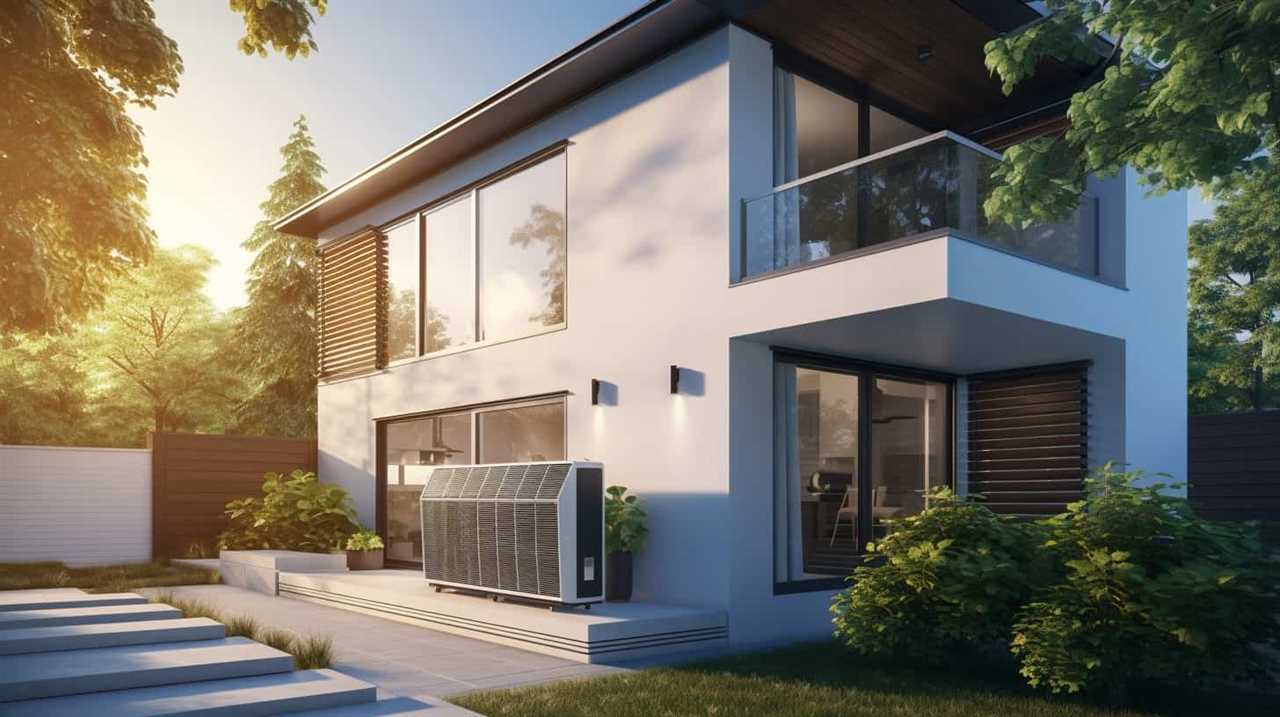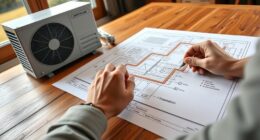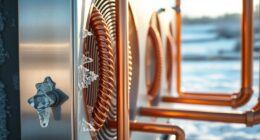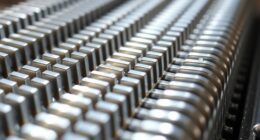Are you ready to dive into the fascinating world of efficient heat pumps? Join us as we unravel the cost-savings mystery and uncover the secrets behind these energy-saving wonders.
In this article, we’ll explore the factors that affect their cost-effectiveness, compare different models’ energy efficiency ratings, and reveal how these ratings translate into tangible savings.
Plus, we’ll share valuable tips for maximizing the cost-savings potential of your efficient heat pump.
Get ready to embark on a journey of energy efficiency and financial sustainability.

Key Takeaways
- Energy efficiency ratings, expressed as the coefficient of performance (COP), indicate the efficiency of converting energy into heat.
- Proper installation and accurate measurement of energy consumption are crucial for determining energy efficiency.
- The initial investment, energy efficiency rating, and maintenance costs should be considered for the cost-effectiveness of heat pumps.
- Comparing energy efficiency ratings of different heat pump models helps determine potential energy savings and long-term cost-effectiveness.
Understanding Energy Efficiency Ratings
Do we know how energy efficiency ratings work for heat pumps?
Understanding how energy efficiency ratings are measured is crucial in determining the cost-effectiveness of heat pumps. Energy efficiency ratings are based on the ratio of heat output to energy consumption. This ratio is expressed as the coefficient of performance (COP). The higher the COP, the more efficient the heat pump is in converting energy into heat.
Measuring energy consumption accurately is essential to determine the actual energy efficiency of a heat pump. It’s also important to note that proper installation plays a significant role in achieving optimal energy efficiency. A poorly installed heat pump can lead to energy wastage and reduced efficiency.
Now that we understand the basics of energy efficiency ratings, let’s explore the factors that affect the cost-effectiveness of heat pumps.

Factors Affecting the Cost-Effectiveness of Heat Pumps
Now let’s delve into the factors that impact the cost-effectiveness of heat pumps.
When considering the cost-effectiveness of heat pump installation, there are several key factors to keep in mind:
-
Initial Investment: The upfront cost of purchasing and installing a heat pump can vary depending on the size and efficiency of the unit.
-
Energy Efficiency: The energy efficiency rating of a heat pump determines how effectively it can convert energy into heat. A higher rating means lower energy consumption and potentially lower utility bills.

-
Maintenance Costs: Regular maintenance is essential to keep your heat pump running efficiently. It’s important to factor in the cost of routine maintenance and any potential repairs that may be needed over time.
Understanding these factors can help you make an informed decision about the cost-effectiveness of heat pumps.
Now, let’s move on to comparing energy efficiency ratings of different heat pump models.
Comparing Energy Efficiency Ratings of Different Heat Pump Models
Let’s compare the energy efficiency ratings of different heat pump models to determine the most efficient option. When choosing a heat pump for your home, it is important to consider its energy efficiency as it directly impacts your energy consumption and costs. To help you make an informed decision, here is a comparison of three popular heat pump models:

| Model | Energy Efficiency Rating |
|---|---|
| Model A | 15 SEER |
| Model B | 18 SEER |
| Model C | 20 SEER |
As you can see, Model C has the highest energy efficiency rating of 20 SEER, making it the most efficient option. While the initial cost of installation may be higher, the long-term energy savings can offset this expense. Additionally, maintenance costs may be lower for more efficient models, as they tend to have advanced features and require less frequent repairs.
Now that we have compared the energy efficiency ratings of different heat pump models, let’s explore the relationship between energy efficiency and cost savings.
The Relationship Between Energy Efficiency and Cost Savings
When considering energy efficiency and cost savings, it’s important to understand the direct correlation between the two. Here are some key points to keep in mind:
-
Energy consumption analysis: Evaluating the energy consumption of different heat pump models can help determine their efficiency and potential cost savings. Look for models with higher Energy Efficiency Ratio (EER) and Seasonal Energy Efficiency Ratio (SEER) ratings.

-
Long-term savings evaluation: While energy-efficient heat pumps may have a higher upfront cost, they can lead to significant long-term savings. Consider the lifetime cost of operation, including energy savings and potential maintenance expenses.
-
Cost-savings potential: Efficient heat pumps can save homeowners money on their energy bills, reducing monthly expenses. Understanding the relationship between energy efficiency and cost savings can help homeowners make informed decisions about their heating and cooling systems.
By understanding the relationship between energy efficiency and cost savings, homeowners can make informed choices to maximize the potential savings of efficient heat pumps.
Now, let’s explore some tips for maximizing their cost-savings potential.

Tips for Maximizing the Cost-Savings Potential of Efficient Heat Pumps
To maximize the cost-savings potential of efficient heat pumps, we can implement these tips.
First, utilize energy-saving techniques such as proper insulation and sealing of windows and doors to minimize heat loss. This ensures that the heat pump operates efficiently and reduces energy consumption.
Additionally, regular heat pump maintenance is crucial. Clean or replace air filters regularly to maintain optimal airflow and prevent dust and debris from hindering performance. It’s also important to schedule professional maintenance checks to identify and address any potential issues early on.
Lastly, adjusting the thermostat settings wisely can significantly impact cost savings. Lowering the temperature when the house is unoccupied or during sleeping hours can reduce energy usage without compromising comfort.

Frequently Asked Questions
Are There Any Government Incentives or Rebates Available for Installing Efficient Heat Pumps?
Yes, there are government incentives and rebates available for installing efficient heat pumps. These can help offset the initial cost and make the investment more affordable for homeowners.
How Do Heat Pumps Compare to Other Heating and Cooling Systems in Terms of Cost-Effectiveness?
When examining cost-effectiveness, heat pumps excel in comparison to traditional systems. A long-term cost analysis reveals their efficiency and potential savings. They offer a visually appealing and intimate solution for heating and cooling needs.
Can Efficient Heat Pumps Be Installed in All Types of Homes, Regardless of Size or Layout?
Efficient heat pumps have efficiency limitations and may not be suitable for all homes, especially older ones. Factors such as size and layout can affect installation feasibility and overall effectiveness.
What Is the Average Lifespan of an Efficient Heat Pump, and How Does It Affect Cost Savings?
The average lifespan of an efficient heat pump directly affects cost savings. A longer lifespan allows for more savings over time. We can help you understand the potential cost savings of an efficient heat pump.

Are There Any Additional Maintenance or Servicing Requirements for Efficient Heat Pumps Compared to Conventional Heating Systems?
There are additional maintenance requirements for efficient heat pumps compared to conventional heating systems. These requirements can increase servicing costs, but they are necessary to ensure optimal performance and maximize cost savings.
Conclusion
In conclusion, understanding the energy efficiency ratings of heat pumps is crucial in determining their cost-effectiveness.
By comparing different models and considering factors like climate and usage patterns, we can maximize the potential cost savings of efficient heat pumps.
Remember, the higher the energy efficiency rating, the greater the savings on your energy bills.

So, choose wisely and enjoy the parallel benefits of reduced costs and increased comfort in your home.









